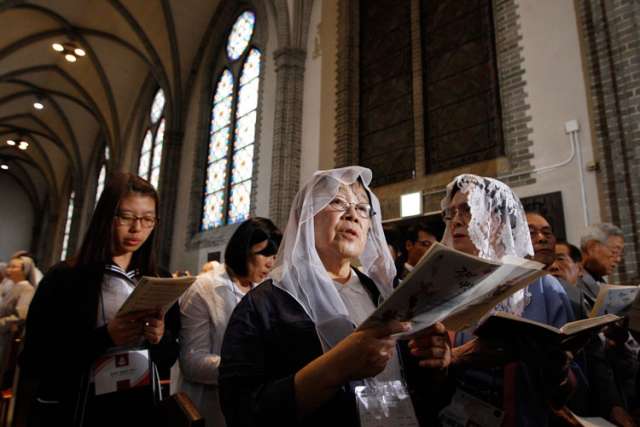Fr. Scott Lewis is an associate professor of New Testament at Regis College, a founding member of the Toronto School of Theology.
He is a past president of the Canadian Catholic Biblical Association.
22nd Sunday in Ordinary Time (Year A) Aug. 31 (Jeremiah 20:7-9; Psalm 63; Romans 12:1-2; Matthew 16:21-27)
We can perhaps sympathize with Jeremiah. He did not ask for the calling of a prophet — in fact, he was dragged kicking and screaming into his role as God’s mouthpiece.
No favourites, only justice, compassion
By Fr. Scott Lewis, S.J21st Sunday in Ordinary Time (Year A) Aug. 24 (Isaiah 22:15, 19-23; Psalm 138; Romans 11:33-36; Matthew 16:13-20)
No one has an absolute right to a position of trust and authority. Along with authority there is responsibility and accountability, and however slowly the wheels of justice turn they grind exceedingly fine. Shebna discovered this to his chagrin when he was fired by one against whom there is no appeal — God. The people of Israel believed God raised up individuals to govern the nation, but they were also positive God could and would dismiss anyone who abused that trust.
We don’t own God
By Fr. Scott Lewis, S.J20th Sunday in Ordinary Time (Year A) Aug. 17 (Isaiah 56:1, 6-7; Psalm 67; Romans 11:13-15, 29-32; Matthew 15:21-28)
There has always been a battle of wills between God and human beings. Something in our wounded human nature prods us to do our best to possess God for ourselves and the group with whom we identify. This “possession” of God is great for inflating the collective ego and enhancing a sense of superiority towards outsiders. It is also a key contributing factor to religious hatred and violence. Additionally, it prevents us from honest self-examination and robs us of the wisdom and riches of other cultures and belief systems. God is on the other end of the tug-of-war and has very different ideas. God’s intent is always to the greater and the more universal and inclusive.
Faith is in opposition to fear and doubt
By Fr. Scott Lewis, S.J19th Sunday in Ordinary Time Aug. 10, (1 Kings 19:9, 11-13; Psalm 85; Romans 9:1-5; Matthew 14:22-33)
To many people God seems absent from our world. Often it is difficult to discern the presence of God in one’s own life. Part of the reason is that our perception of God is filtered through far too many expectations. We have set ideas about how God is to be revealed and they are usually dramatic, flashy and filled with displays of power — all fine material for Hollywood biblical epics. Compounding the problem is the tendency of ancient peoples to assign manifestations of nature to the immediate hand of God. Our scientific understanding of the natural order would prevent most of us from seeing the hand of God in an earthquake, hurricane or tsunami.
Marvelous things happen with God
By Fr. Scott Lewis, S.J18th Sunday in Ordinary Time (Year A) Aug. 3 (Isaiah 55:1-3; Psalm 145; Romans 8:35, 37-39; Matthew 14:13-21)
Remember when pillows and blankets on airplanes were free and there was no charge for baggage? Those days are gone forever, and increasingly every dimension of daily life has charges and costs tied to them.
No shortcuts to God
By Fr. Scott Lewis, S.J17th Sunday in Ordinary Time (Year A) July 27 (1 Kings 3:5-12; Psalm 119; Romans 8:28-30; Matthew 13:44-52)
If we were granted one wish, what would we ask for? The answer to that question would say a lot about our character and personality.
The Spirit guides
By Fr. Scott Lewis, S.J16th Sunday in Ordinary Time (Year A) July 20 (Wisdom 12:13, 16-19; Psalm 86; Romans 8:26-27; Matthew 13:24-43)
The truly great and powerful are those who often choose not to fully exercise their power. Human cultures tend to follow those who can flex their muscles, bully and threaten and coerce others through fear. Even when displays of power are called for, these individuals are prone to using far more than necessary and often in ways that are unjust and lacking in compassion.
God’s word is at work worldwide
By Fr. Scott Lewis, S.J15th Sunday in Ordinary Time (Year A) July 13 (Isaiah 55:10-11; Psalm 65; Romans 8:18-23; Matthew 13:1-23)
When is a word more than a word? We usually associate words with the squiggles on a page or a discrete unit of speech. In the case of the Scriptures this view can lead to narrow, overly literal and superficial understanding.
Live by the Spirit
By Fr. Scott Lewis, S.J14th Sunday in Ordinary Time (Year A) July 6 (Zechariah 9:9-10; Psalm 145; Romans 8:9, 11-13; Matthew 11:25-30)
Wouldn’t it be wonderful if a superhero arrived on the scene and put an end to the wars in Iraq, Syria and Afghanistan, as well as all acts of terrorism and violence?
The Kingdom’s keys belong to those who are faithful
By Fr. Scott Lewis, S.JSts. Peter and Paul (Year A) June 29 (Acts 12:1-11; Psalm 34; 2 Timothy 4:6-8; 17-18; Matthew 16:13-19)
Dramatic prison breaks are featured in many novels and movies. Recently Canadians were shocked at a daring helicopter escape from a prison in Quebec. Peter, however, could top any of these stories. He was sprung from captivity by an angel!
How we deal with adversity reveals our commitment to God
By Fr. Scott Lewis, S.JBody and Blood of Christ (Year A) June 22 (Deuteronomy 8:2-3, 14-16; Psalm 147; 1 Corinthians 10:16-17; John 6:51-59)
Man does not live by bread alone, but by every word that comes from the mouth of God. If only it were true!











